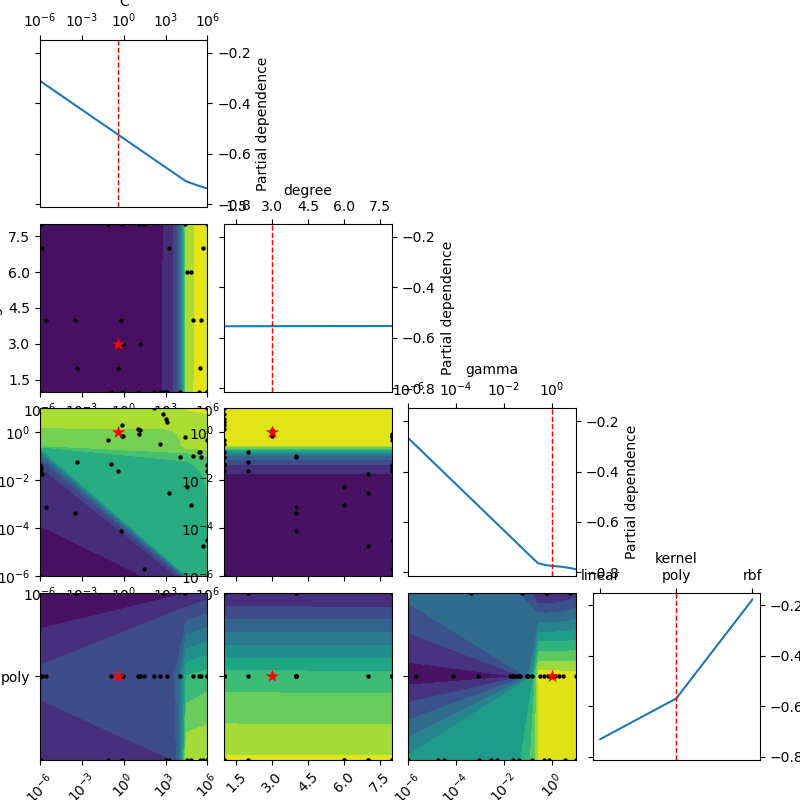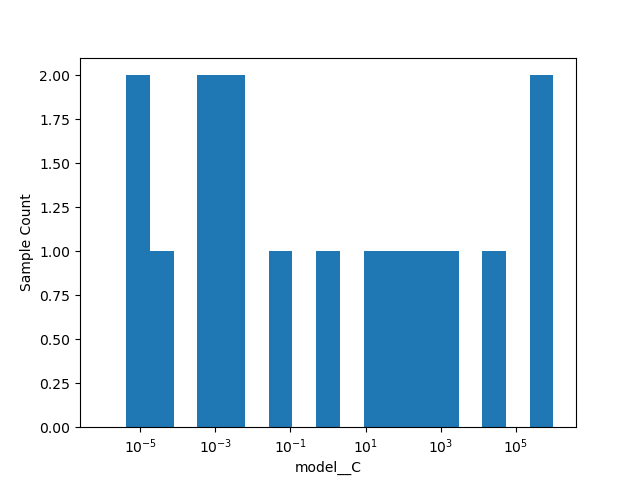Note
Click here to download the full example code or to run this example in your browser via Binder
Scikit-learn hyperparameter search wrapper¶
Iaroslav Shcherbatyi, Tim Head and Gilles Louppe. June 2017. Reformatted by Holger Nahrstaedt 2020
Introduction¶
This example assumes basic familiarity with scikit-learn.
Search for parameters of machine learning models that result in best
cross-validation performance is necessary in almost all practical
cases to get a model with best generalization estimate. A standard
approach in scikit-learn is using sklearn.model_selection.GridSearchCV class, which takes
a set of values for every parameter to try, and simply enumerates all
combinations of parameter values. The complexity of such search grows
exponentially with the addition of new parameters. A more scalable
approach is using sklearn.model_selection.RandomizedSearchCV, which however does not take
advantage of the structure of a search space.
Scikit-optimize provides a drop-in replacement for sklearn.model_selection.GridSearchCV,
which utilizes Bayesian Optimization where a predictive model referred
to as “surrogate” is used to model the search space and utilized to
arrive at good parameter values combination as soon as possible.
Note: for a manual hyperparameter optimization example, see “Hyperparameter Optimization” notebook.
print(__doc__)
import numpy as np
np.random.seed(123)
import matplotlib.pyplot as plt
Minimal example¶
A minimal example of optimizing hyperparameters of SVC (Support Vector machine Classifier) is given below.
from skopt import BayesSearchCV
from sklearn.datasets import load_digits
from sklearn.svm import SVC
from sklearn.model_selection import train_test_split
X, y = load_digits(n_class=10, return_X_y=True)
X_train, X_test, y_train, y_test = train_test_split(X, y, train_size=0.75, test_size=.25, random_state=0)
# log-uniform: understand as search over p = exp(x) by varying x
opt = BayesSearchCV(
SVC(),
{
'C': (1e-6, 1e+6, 'log-uniform'),
'gamma': (1e-6, 1e+1, 'log-uniform'),
'degree': (1, 8), # integer valued parameter
'kernel': ['linear', 'poly', 'rbf'], # categorical parameter
},
n_iter=32,
cv=3
)
opt.fit(X_train, y_train)
print("val. score: %s" % opt.best_score_)
print("test score: %s" % opt.score(X_test, y_test))
Out:
val. score: 0.985894580549369
test score: 0.9822222222222222
Advanced example¶
In practice, one wants to enumerate over multiple predictive model classes, with different search spaces and number of evaluations per class. An example of such search over parameters of Linear SVM, Kernel SVM, and decision trees is given below.
from skopt import BayesSearchCV
from skopt.space import Real, Categorical, Integer
from skopt.plots import plot_objective, plot_histogram
from sklearn.datasets import load_digits
from sklearn.svm import LinearSVC, SVC
from sklearn.pipeline import Pipeline
from sklearn.model_selection import train_test_split
X, y = load_digits(n_class=10, return_X_y=True)
X_train, X_test, y_train, y_test = train_test_split(X, y, random_state=0)
# pipeline class is used as estimator to enable
# search over different model types
pipe = Pipeline([
('model', SVC())
])
# single categorical value of 'model' parameter is
# sets the model class
# We will get ConvergenceWarnings because the problem is not well-conditioned.
# But that's fine, this is just an example.
linsvc_search = {
'model': [LinearSVC(max_iter=1000)],
'model__C': (1e-6, 1e+6, 'log-uniform'),
}
# explicit dimension classes can be specified like this
svc_search = {
'model': Categorical([SVC()]),
'model__C': Real(1e-6, 1e+6, prior='log-uniform'),
'model__gamma': Real(1e-6, 1e+1, prior='log-uniform'),
'model__degree': Integer(1,8),
'model__kernel': Categorical(['linear', 'poly', 'rbf']),
}
opt = BayesSearchCV(
pipe,
# (parameter space, # of evaluations)
[(svc_search, 40), (linsvc_search, 16)],
cv=3
)
opt.fit(X_train, y_train)
print("val. score: %s" % opt.best_score_)
print("test score: %s" % opt.score(X_test, y_test))
print("best params: %s" % str(opt.best_params_))
Out:
/home/circleci/miniconda/envs/testenv/lib/python3.9/site-packages/scikit_learn-1.0-py3.9-linux-x86_64.egg/sklearn/svm/_base.py:1199: ConvergenceWarning: Liblinear failed to converge, increase the number of iterations.
warnings.warn(
/home/circleci/miniconda/envs/testenv/lib/python3.9/site-packages/scikit_learn-1.0-py3.9-linux-x86_64.egg/sklearn/svm/_base.py:1199: ConvergenceWarning: Liblinear failed to converge, increase the number of iterations.
warnings.warn(
/home/circleci/miniconda/envs/testenv/lib/python3.9/site-packages/scikit_learn-1.0-py3.9-linux-x86_64.egg/sklearn/svm/_base.py:1199: ConvergenceWarning: Liblinear failed to converge, increase the number of iterations.
warnings.warn(
/home/circleci/miniconda/envs/testenv/lib/python3.9/site-packages/scikit_learn-1.0-py3.9-linux-x86_64.egg/sklearn/svm/_base.py:1199: ConvergenceWarning: Liblinear failed to converge, increase the number of iterations.
warnings.warn(
/home/circleci/miniconda/envs/testenv/lib/python3.9/site-packages/scikit_learn-1.0-py3.9-linux-x86_64.egg/sklearn/svm/_base.py:1199: ConvergenceWarning: Liblinear failed to converge, increase the number of iterations.
warnings.warn(
/home/circleci/miniconda/envs/testenv/lib/python3.9/site-packages/scikit_learn-1.0-py3.9-linux-x86_64.egg/sklearn/svm/_base.py:1199: ConvergenceWarning: Liblinear failed to converge, increase the number of iterations.
warnings.warn(
/home/circleci/miniconda/envs/testenv/lib/python3.9/site-packages/scikit_learn-1.0-py3.9-linux-x86_64.egg/sklearn/svm/_base.py:1199: ConvergenceWarning: Liblinear failed to converge, increase the number of iterations.
warnings.warn(
/home/circleci/miniconda/envs/testenv/lib/python3.9/site-packages/scikit_learn-1.0-py3.9-linux-x86_64.egg/sklearn/svm/_base.py:1199: ConvergenceWarning: Liblinear failed to converge, increase the number of iterations.
warnings.warn(
/home/circleci/miniconda/envs/testenv/lib/python3.9/site-packages/scikit_learn-1.0-py3.9-linux-x86_64.egg/sklearn/svm/_base.py:1199: ConvergenceWarning: Liblinear failed to converge, increase the number of iterations.
warnings.warn(
/home/circleci/miniconda/envs/testenv/lib/python3.9/site-packages/scikit_learn-1.0-py3.9-linux-x86_64.egg/sklearn/svm/_base.py:1199: ConvergenceWarning: Liblinear failed to converge, increase the number of iterations.
warnings.warn(
/home/circleci/miniconda/envs/testenv/lib/python3.9/site-packages/scikit_learn-1.0-py3.9-linux-x86_64.egg/sklearn/svm/_base.py:1199: ConvergenceWarning: Liblinear failed to converge, increase the number of iterations.
warnings.warn(
/home/circleci/miniconda/envs/testenv/lib/python3.9/site-packages/scikit_learn-1.0-py3.9-linux-x86_64.egg/sklearn/svm/_base.py:1199: ConvergenceWarning: Liblinear failed to converge, increase the number of iterations.
warnings.warn(
/home/circleci/miniconda/envs/testenv/lib/python3.9/site-packages/scikit_learn-1.0-py3.9-linux-x86_64.egg/sklearn/svm/_base.py:1199: ConvergenceWarning: Liblinear failed to converge, increase the number of iterations.
warnings.warn(
/home/circleci/miniconda/envs/testenv/lib/python3.9/site-packages/scikit_learn-1.0-py3.9-linux-x86_64.egg/sklearn/svm/_base.py:1199: ConvergenceWarning: Liblinear failed to converge, increase the number of iterations.
warnings.warn(
/home/circleci/miniconda/envs/testenv/lib/python3.9/site-packages/scikit_learn-1.0-py3.9-linux-x86_64.egg/sklearn/svm/_base.py:1199: ConvergenceWarning: Liblinear failed to converge, increase the number of iterations.
warnings.warn(
/home/circleci/miniconda/envs/testenv/lib/python3.9/site-packages/scikit_learn-1.0-py3.9-linux-x86_64.egg/sklearn/svm/_base.py:1199: ConvergenceWarning: Liblinear failed to converge, increase the number of iterations.
warnings.warn(
/home/circleci/miniconda/envs/testenv/lib/python3.9/site-packages/scikit_learn-1.0-py3.9-linux-x86_64.egg/sklearn/svm/_base.py:1199: ConvergenceWarning: Liblinear failed to converge, increase the number of iterations.
warnings.warn(
/home/circleci/miniconda/envs/testenv/lib/python3.9/site-packages/scikit_learn-1.0-py3.9-linux-x86_64.egg/sklearn/svm/_base.py:1199: ConvergenceWarning: Liblinear failed to converge, increase the number of iterations.
warnings.warn(
/home/circleci/miniconda/envs/testenv/lib/python3.9/site-packages/scikit_learn-1.0-py3.9-linux-x86_64.egg/sklearn/svm/_base.py:1199: ConvergenceWarning: Liblinear failed to converge, increase the number of iterations.
warnings.warn(
/home/circleci/miniconda/envs/testenv/lib/python3.9/site-packages/scikit_learn-1.0-py3.9-linux-x86_64.egg/sklearn/svm/_base.py:1199: ConvergenceWarning: Liblinear failed to converge, increase the number of iterations.
warnings.warn(
/home/circleci/miniconda/envs/testenv/lib/python3.9/site-packages/scikit_learn-1.0-py3.9-linux-x86_64.egg/sklearn/svm/_base.py:1199: ConvergenceWarning: Liblinear failed to converge, increase the number of iterations.
warnings.warn(
/home/circleci/miniconda/envs/testenv/lib/python3.9/site-packages/scikit_learn-1.0-py3.9-linux-x86_64.egg/sklearn/svm/_base.py:1199: ConvergenceWarning: Liblinear failed to converge, increase the number of iterations.
warnings.warn(
/home/circleci/miniconda/envs/testenv/lib/python3.9/site-packages/scikit_learn-1.0-py3.9-linux-x86_64.egg/sklearn/svm/_base.py:1199: ConvergenceWarning: Liblinear failed to converge, increase the number of iterations.
warnings.warn(
/home/circleci/miniconda/envs/testenv/lib/python3.9/site-packages/scikit_learn-1.0-py3.9-linux-x86_64.egg/sklearn/svm/_base.py:1199: ConvergenceWarning: Liblinear failed to converge, increase the number of iterations.
warnings.warn(
/home/circleci/miniconda/envs/testenv/lib/python3.9/site-packages/scikit_learn-1.0-py3.9-linux-x86_64.egg/sklearn/svm/_base.py:1199: ConvergenceWarning: Liblinear failed to converge, increase the number of iterations.
warnings.warn(
/home/circleci/miniconda/envs/testenv/lib/python3.9/site-packages/scikit_learn-1.0-py3.9-linux-x86_64.egg/sklearn/svm/_base.py:1199: ConvergenceWarning: Liblinear failed to converge, increase the number of iterations.
warnings.warn(
/home/circleci/miniconda/envs/testenv/lib/python3.9/site-packages/scikit_learn-1.0-py3.9-linux-x86_64.egg/sklearn/svm/_base.py:1199: ConvergenceWarning: Liblinear failed to converge, increase the number of iterations.
warnings.warn(
val. score: 0.985894580549369
test score: 0.9822222222222222
best params: OrderedDict([('model', SVC(C=0.41571471424085416, gamma=1.0560013164213486, kernel='poly')), ('model__C', 0.41571471424085416), ('model__degree', 3), ('model__gamma', 1.0560013164213486), ('model__kernel', 'poly')])
Partial Dependence plot of the objective function for SVC
_ = plot_objective(opt.optimizer_results_[0],
dimensions=["C", "degree", "gamma", "kernel"],
n_minimum_search=int(1e8))
plt.show()

Plot of the histogram for LinearSVC
_ = plot_histogram(opt.optimizer_results_[1], 1)
plt.show()

Progress monitoring and control using callback argument of fit method¶
It is possible to monitor the progress of BayesSearchCV with an event
handler that is called on every step of subspace exploration. For single job
mode, this is called on every evaluation of model configuration, and for
parallel mode, this is called when n_jobs model configurations are evaluated
in parallel.
Additionally, exploration can be stopped if the callback returns True.
This can be used to stop the exploration early, for instance when the
accuracy that you get is sufficiently high.
An example usage is shown below.
from skopt import BayesSearchCV
from sklearn.datasets import load_iris
from sklearn.svm import SVC
X, y = load_iris(return_X_y=True)
searchcv = BayesSearchCV(
SVC(gamma='scale'),
search_spaces={'C': (0.01, 100.0, 'log-uniform')},
n_iter=10,
cv=3
)
# callback handler
def on_step(optim_result):
score = -optim_result['fun']
print("best score: %s" % score)
if score >= 0.98:
print('Interrupting!')
return True
searchcv.fit(X, y, callback=on_step)
Out:
best score: 0.98
Interrupting!
BayesSearchCV(cv=3, estimator=SVC(), n_iter=10,
search_spaces={'C': (0.01, 100.0, 'log-uniform')})
Counting total iterations that will be used to explore all subspaces¶
Subspaces in previous examples can further increase in complexity if you add
new model subspaces or dimensions for feature extraction pipelines. For
monitoring of progress, you would like to know the total number of
iterations it will take to explore all subspaces. This can be
calculated with total_iterations property, as in the code below.
from skopt import BayesSearchCV
from sklearn.datasets import load_iris
from sklearn.svm import SVC
X, y = load_iris(return_X_y=True)
searchcv = BayesSearchCV(
SVC(),
search_spaces=[
({'C': (0.1, 1.0)}, 19), # 19 iterations for this subspace
{'gamma':(0.1, 1.0)}
],
n_iter=23
)
print(searchcv.total_iterations)
Out:
42
Total running time of the script: ( 1 minutes 37.287 seconds)
Estimated memory usage: 10 MB
